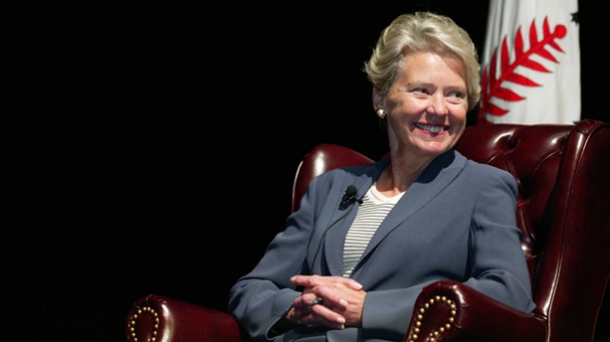You are here

The late Judge Pamela Ann Rymer, LLB '64, gave more than $2 million to help students pursue higher education at Stanford. PHOTO: Steve Gladfelter
Legacy of Justice
The Honorable Pamela Rymer, LLB '64, bequeaths financial aid funds for law students and undergrads.
Winter 2013
Envision the personification of Justice—blindfolded, holding aloft the scales of judgment—and you've got a fair picture of the late Judge Pamela Ann Rymer, LLB '64.
"She was the ideal of what you'd envision justice to be about," says her former clerk and friend Susan Creighton, JD '84. "There was nobody so insignificant in the eyes of the world that she did not give them a fair shake, and no one so powerful that it mattered to her."
There was one subject, however, on which Rymer, who served on the United States Court of Appeals for the Ninth Circuit, was never impartial: Stanford. Before she died of cancer in September 2011, she planned a generous gift to the university. In January 2012, her bequest of $2.23 million endowed two funds in her name, one to provide graduate fellowships for law students, the other to provide scholarships for undergraduate athletes with financial need.
Throughout her career, Rymer was highly regarded not only for her sharp legal mind, but also for her devotion to Stanford Law School. She chaired the Stanford Law School Board of Visitors, sat on the Dean's Strategic Council, and was a perennial reunion volunteer, moot court judge, and law school panelist.
Her passion for Stanford extended beyond the law. Rymer was a member of the university's Board of Trustees from 1991 to 2001. She also served on the board of Stanford's Haas Center for Public Service, chaired the Stanford Associates' Board of Governors, and was a member of the Advisory Council for the Bill Lane Center for the American West and the Alumni Association's Board of Directors.
In 2010, Rymer was awarded the Stanford Medal, recognizing her more than 30 years of volunteer service, advice, and generous financial support.
"Her affection for and dedication to Stanford were extraordinary," says her classmate James C. Gaither, JD '64, who served with her on the Board of Trustees.
Although Creighton recalls that Rymer may have indulged a "slight bias" for Stanford-educated clerks, "she was a wonderful mentor for all of us, and we treasured her," Creighton says.
Rymer's commitment to fairness made a deep impression on all who encountered her. When she was working on a prison overcrowding case, for example, Rymer drove with Creighton from Los Angeles to San Luis Obispo to check on conditions there. "She even had them lock us up in a cell together to see what the prisoners were experiencing," recalls Creighton. "That’s unheard of among judges."
Rymer also made the unconventional decision to move that trial from federal court in Los Angeles to a local courthouse closer to the prison. The number of prisoners testifying would have been limited had they needed to be transported to L.A. Rymer's willingness to do the traveling instead allowed more of them to state their case, says Creighton.
Judge Rymer died in Los Angeles at the age of 70.